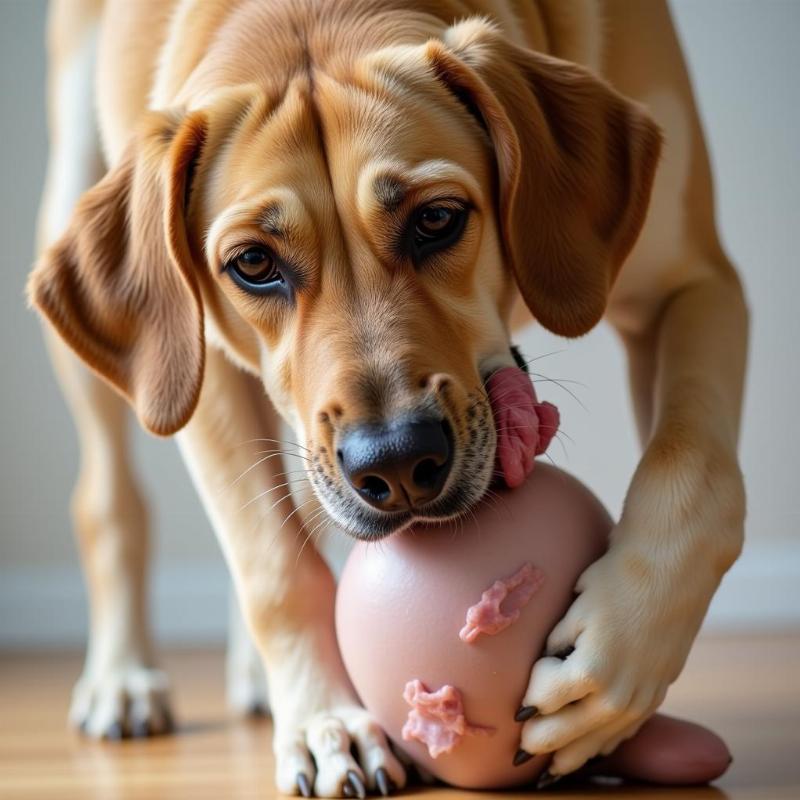If you’ve caught your dog excessively licking their behind, you’re not alone. This is a common concern among dog owners, and while it might seem like a quirky habit, it can often signal an underlying issue. Understanding why your dog keeps licking his butt is crucial to ensuring his comfort and well-being. Let’s explore the potential reasons behind this behavior and what you can do about it.
Common Causes of Butt Licking in Dogs
Several factors can contribute to a dog’s excessive butt licking. These range from simple hygiene issues to more serious medical conditions. Identifying the root cause is the first step towards resolving the problem.
Impacted Anal Glands
Perhaps the most frequent reason for butt licking is impacted or infected anal glands. These small sacs, located on either side of the anus, release a foul-smelling fluid during defecation. If these glands become blocked or infected, they can cause discomfort and irritation, leading to increased licking.
Allergies
Just like humans, dogs can suffer from allergies. Environmental allergies, food allergies, and flea allergies can all cause itchy skin, especially around the rear end. This itchiness can prompt your dog to lick and chew at the area in an attempt to relieve the discomfort.
Parasites
Fleas, ticks, and intestinal parasites like tapeworms can also irritate your dog’s rear end, leading to increased licking. If you notice small white segments resembling rice grains around your dog’s anus, it could be a sign of tapeworms.
Skin Infections
Bacterial or fungal skin infections can cause itching and inflammation around the anus, prompting your dog to lick the area. These infections can be triggered by allergies, parasites, or other underlying skin conditions.
Behavioral Issues
In some cases, excessive licking can be a sign of anxiety, boredom, or stress. This type of licking is often accompanied by other behavioral changes, such as excessive chewing, pacing, or whining.
 Chó liếm mông
Chó liếm mông
What to Do If Your Dog Keeps Licking Their Butt
If you notice your dog excessively licking their behind, it’s essential to address the issue promptly. Here are some steps you can take:
- Consult your veterinarian: A veterinarian can properly diagnose the underlying cause of the licking and recommend appropriate treatment. They can also express your dog’s anal glands if necessary.
- Check for parasites: Regularly inspect your dog for fleas and ticks and administer preventative medications as recommended by your vet. Have your dog tested for intestinal parasites if you suspect they might be present.
- Address allergies: If allergies are suspected, your veterinarian can perform allergy testing to identify the allergens and recommend appropriate management strategies, such as hypoallergenic diets or medication.
Home Remedies and Preventative Measures
While veterinary care is crucial for addressing underlying medical conditions, there are some things you can do at home to help prevent and manage butt licking:
- Maintain good hygiene: Regularly clean your dog’s rear area with a pet-friendly wipe or damp cloth.
- Provide a balanced diet: A healthy diet can support your dog’s immune system and reduce the risk of skin problems and allergies.
- Grooming: Regular brushing can help prevent matting and tangles, which can trap dirt and moisture and contribute to skin irritation.
- Mental and physical enrichment: Providing plenty of exercise and mental stimulation can help reduce anxiety and boredom-related licking.
Conclusion
Excessive butt licking in dogs can be a sign of various underlying issues, from impacted anal glands to allergies and behavioral problems. By paying attention to your dog’s behavior and seeking veterinary care when necessary, you can ensure your furry friend’s comfort and well-being. Don’t dismiss this seemingly harmless habit; it could be your dog’s way of telling you something is wrong.
FAQ
- How often should a dog’s anal glands be expressed? It varies, but some dogs require regular expression, while others never need it. Your vet can determine the appropriate frequency for your dog.
- Can I express my dog’s anal glands myself? While it’s possible, it’s best to have a veterinarian or professional groomer perform this procedure to avoid injury.
- What are the signs of impacted anal glands? Scooting, excessive licking, a foul odor, and discomfort are common signs.
- Are certain breeds more prone to anal gland problems? Smaller breeds tend to experience anal gland issues more frequently.
- Can diet affect anal gland health? Adding fiber to your dog’s diet can sometimes help regulate bowel movements and anal gland emptying.
- Is butt licking always a sign of a medical problem? Not always, occasional licking can be normal grooming behavior. However, excessive licking warrants investigation.
- What should I do if home remedies don’t work? Consult your veterinarian for a proper diagnosis and treatment plan.
Related Articles
- can dogs get anal glands removed
- best anti chew spray for dogs
- giardia test kit for dogs
- why is my dog swallowing so much
- stop dog from barking at other dogs
Beautdogs.us is your premier resource for all things dog-related in the US. We offer expert advice on dog breeds, care, and product recommendations for both new and experienced dog owners. From understanding why your dog keeps licking his butt to choosing the best anti-chew spray, Beautdogs.us is your trusted source for comprehensive and engaging dog care information. Contact us for personalized support at [email protected] or +1 501-555-7529.